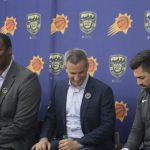- Slug: Sports-Suns Pride Night, 913 words
- Photo available
By ROBERT GUNDRAN
Cronkite News
PHOENIX — The first openly-gay active NBA player called on current players to show their support and be allies to the LGBT community.
Basketball first showed a tendency toward progress when center Jason Collins came out after the 2012-13 season.
Collins worked with Sports Illustrated writer Frank Lidz in crafting his story about coming out to the world. Collins said he released the story after speaking to his family and friends.
“Coming out to my close friends and family was a bit more difficult because I had to have one-on-one conversations with them about 20 times,” said Collins, who was speaking at a panel during the Phoenix Suns Pride Night on Tuesday at Talking Stick Resort Arena. “When I came out to the public it was like ripping the bandage off.”
Collins was the first openly gay man to come out while competing in one of the four major professional leagues. He is also the only player to be out since.
“I think the NBA is definitely ready for another athlete to step out and live their life,” Collins said. “Before I came out, people who used homophobic language were fined a minimum of $50,000. Kobe Bryant unfortunately used that type of language and was fined.”
“That signaled to me that if Kobe can get fined, anyone can get fined, and the message was clear that they supported the LGBT community,” he added.
Although the league as an organization has shown to be on a path toward inclusivity and acceptance, even going as far as having a float in New York’s Pride March, players haven’t been as active.
“I love that we were the first sports league to participate in the New York Pride Parade,” Collins said. “But we don’t have any active NBA players participating in the parade. I’d like to see someone like Russell Westbrook or Devin Booker standing alongside and being that ally.”
Tuesday night was the first Pride Night for the Suns, but it’s something the Phoenix Mercury have been doing for years.
Vince Kozar, the Chief Operating Officer for the Mercury, said the WNBA’s social attitude comes from the attitude of its fan base and players.
“I think our players are vocal and outspoken, and when your players want to lead, then they have to lead,” said Kozar, who is openly gay and an advocate for LGBT rights. “Instead of fighting against it, the league wants to be a part of it and in support of it.”
The WNBA doesn’t have the same number of viewers as the NFL, NBA, NHL or MLB, but it did have an openly gay player in Sheryl Swoopes before any of the men’s sports league.
“Yes I was the first man (in sports to come out), but women have been doing this for decades,” Collins said. “I wouldn’t have my path without Billie Jean King. When they came out they got death threats and lost sponsorships. I wouldn’t be where I am without women.”
Collins and Kozar were members of a panel during Pride Night, alongside emcee Tom Leander, President of ONE Community Angela Hughey and former Tempe mayor Neil Giuliano.
In 1998, Giuliano was the first openly gay mayor in the United States to be elected into office. He said it’s been interesting to see the shift in culture over the past two decades.
“To see the culture change over the years toward LGBT acceptance has been great,” Giuliano said. “I think we’re making a lot of progress.”
Collins said that although there has been progress over the years, it might not have reached the NBA on a player-to-player basis yet.
“People still worry about losing their endorsement deals and being shunned in the locker room,” Collins said. “That’s just not the case.”
The former center for the Brooklyn Nets came out a few years after Prop 8, a ballot measure in California meant to prohibit same-sex marriage, passed.
Although Collins didn’t explicitly come out because of an injustice against him, it was still a watershed moment in professional sports. He said he wasn’t sure if he would get another opportunity to play professional basketball after coming out.
“I knew that I might only get one opportunity and I needed to be ready,” Collins said. “There was only one team that gave me an opportunity and I’m thankful to the Nets for being that team.”
Collins likened his experience to another athlete, Colin Kaepernick.
“I’m such a huge fan of Colin Kaepernick, and I want him to be back in the NFL,” Collins said. My hope is that one team will give Colin that opportunity, and that when he has that opportunity he’s ready and dominates it.”
“You have to be strong and know that good things are going to happen. I think when we look back on history, Muhammad Ali was shunned, but he was on the right side of history. I knew that I was on the right side of history, and I know that Colin Kaepernick is on the right side of history.”
Collins also noted that there’s an entire world waiting for the next openly gay athlete to emerge in team sports.
“There’s opportunities in business for endorsements,” he said. “We see that with Adam Rippon and other athletes that the Olympics were tapping into.
“When I went back into the NBA, my jersey was the best-selling jersey in the league for two weeks. There’s a reason why my jersey was number one and LeBron’s wasn’t at that time.”
For more stories from Cronkite News, visit cronkitenews.azpbs.org.
